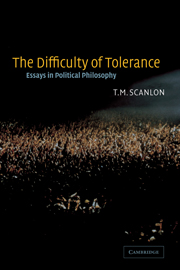Book contents
- Frontmatter
- Contents
- Acknowledgments
- Introduction
- 1 A theory of freedom of expression
- 2 Rights, goals, and fairness
- 3 Due process
- 4 Preference and urgency
- 5 Freedom of expression and categories of expression
- 6 Human rights as a neutral concern
- 7 Contractualism and utilitarianism
- 8 Content regulation reconsidered
- 9 Value, desire, and quality of life
- 10 The difficulty of tolerance
- 11 The diversity of objections to inequality
- 12 Punishment and the rule of law
- 13 Promises and contracts
- Index
8 - Content regulation reconsidered
Published online by Cambridge University Press: 15 December 2009
- Frontmatter
- Contents
- Acknowledgments
- Introduction
- 1 A theory of freedom of expression
- 2 Rights, goals, and fairness
- 3 Due process
- 4 Preference and urgency
- 5 Freedom of expression and categories of expression
- 6 Human rights as a neutral concern
- 7 Contractualism and utilitarianism
- 8 Content regulation reconsidered
- 9 Value, desire, and quality of life
- 10 The difficulty of tolerance
- 11 The diversity of objections to inequality
- 12 Punishment and the rule of law
- 13 Promises and contracts
- Index
Summary
INTRODUCTION
For many years I have thought that there was an important and appealing fundamental truth behind Justice Thurgood Marshall's observation that “above all else, the First Amendment means that government has no power to restrict expression because of its message, its ideas, its subject matter, or its content.” As the years have gone by, however, this truth has come to seem more elusive, more limited, and less fundamental than it once did. What follows is an attempt to reexamine the impermissibility of content-based restrictions by regarding it as one element within a larger view of freedom of expression as a right.
The idea that there is something especially bad about government regulation of the content of expression, whether this takes the form of prohibiting some contents or requiring others, has obvious relevance to many questions about the regulation of mass media, ranging from restrictions on advertising of alcohol and tobacco products to the fairness doctrine and statutes mandating a right to reply to political editorials. I shall discuss some of these issues briefly, but I shall not be able to explore any of them in detail. My aim is, rather, to provide a general framework within which they can be discussed in a systematic way.
THE STRUCTURE OF RIGHTS
In my view, rights are constraints on discretion to act that we believe to be important means for avoiding morally unacceptable consequences.
- Type
- Chapter
- Information
- The Difficulty of ToleranceEssays in Political Philosophy, pp. 151 - 168Publisher: Cambridge University PressPrint publication year: 2003
- 4
- Cited by

